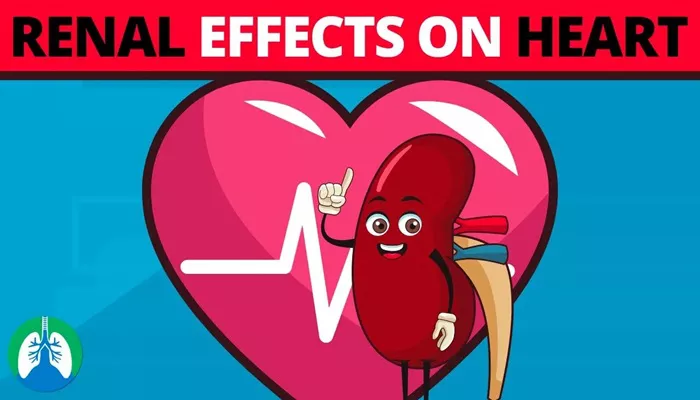Kidney failure, or chronic kidney disease (CKD), significantly affects cardiovascular health. The relationship between the kidneys and the heart is intricate and reciprocal. When one organ is compromised, it can lead to complications in the other.
This article aims to explore how kidney failure impacts heart health, emphasizing the mechanisms involved, the risks associated with this condition, and potential management strategies.
The Connection Between Kidneys And Heart
The kidneys play a crucial role in maintaining various bodily functions, including:
Waste Removal: They filter waste products and excess fluids from the blood.
Blood Pressure Regulation: By managing fluid levels and producing hormones like renin, they help control blood pressure.
Electrolyte Balance: They maintain proper levels of minerals such as sodium, potassium, and calcium.
The heart’s primary function is to pump oxygenated blood throughout the body. This requires a well-functioning circulatory system. When kidney function declines, it disrupts these processes, leading to cardiovascular complications.
How Kidney Failure Affects Heart Health
Increased Cardiovascular Risk: Patients with CKD have a significantly higher risk of developing cardiovascular diseases (CVD). Studies indicate that about 50% of patients with advanced CKD (stages 4-5) also have CVD1. Cardiovascular mortality accounts for approximately 40% to 50% of deaths in this population, compared to 26% in individuals with normal kidney function.
Systemic Inflammation: CKD induces a chronic inflammatory state in the body. This inflammation contributes to vascular and myocardial remodeling, resulting in conditions such as atherosclerosis (hardening of arteries) and myocardial fibrosis (scarring of heart tissue). These changes can lead to an increased risk of heart attacks and strokes.
Fluid Overload: When kidneys fail, they cannot excrete excess fluid effectively. This can lead to fluid overload, causing hypertension (high blood pressure) and congestive heart failure (CHF). In CHF, the heart struggles to pump blood efficiently, which can further exacerbate kidney dysfunction.
Electrolyte Imbalances: Kidney failure often results in imbalances of electrolytes like potassium. High potassium levels (hyperkalemia) can lead to serious heart rhythm disturbances, increasing the risk of arrhythmias.
Anemia: The kidneys produce erythropoietin, a hormone that stimulates red blood cell production. In CKD, reduced erythropoietin levels can lead to anemia, which decreases oxygen delivery to tissues and can strain the heart further.
Mechanisms Linking Kidney Failure And Heart Disease
The relationship between kidney failure and heart disease is often described as a “cardiorenal syndrome,” where dysfunction in one organ leads to dysfunction in another. Here are some specific mechanisms involved:
Hormonal Changes: Kidney failure alters hormonal balance in the body. For instance, increased levels of renin can raise blood pressure, putting additional strain on the heart.
Vascular Calcification: CKD is associated with vascular calcification due to imbalances in calcium and phosphorus metabolism. This hardens blood vessels and increases cardiovascular risk.
Increased Workload on the Heart: As kidney function declines, the heart must work harder to maintain adequate blood flow throughout the body. This increased workload can lead to hypertrophy (thickening) of the heart muscle and eventually heart failure.
SEE ALSO: Why Is A Low Sodium Diet Important in Heart Failure?
Symptoms of Heart Issues in Kidney Failure Patients
Patients with both kidney failure and heart disease may experience a range of symptoms:
Shortness of Breath: Due to fluid overload or reduced cardiac output.
Fatigue: Often caused by anemia or poor oxygenation.
Swelling: Commonly seen in legs or abdomen due to fluid retention.
Irregular Heartbeat: Resulting from electrolyte imbalances.
Diagnosis And Monitoring
Diagnosing cardiovascular issues in patients with CKD involves several steps:
Medical History Review: Understanding prior health issues like hypertension or diabetes.
Physical Examination: Checking for signs of fluid overload or abnormal heart sounds.
Blood Tests: Assessing kidney function through creatinine levels and glomerular filtration rate (GFR), as well as checking electrolytes.
Imaging Studies: Echocardiograms may be used to evaluate heart structure and function.
Regular monitoring is crucial for early detection of cardiovascular complications in CKD patients.
Management Strategies
Managing the interplay between kidney failure and heart health requires a multifaceted approach:
Lifestyle Modifications:
Dietary Changes: A diet low in sodium can help manage blood pressure; limiting potassium-rich foods may prevent hyperkalemia.
Physical Activity: Regular exercise improves cardiovascular health but should be tailored based on individual capabilities.
Weight Management: Maintaining a healthy weight reduces strain on both the heart and kidneys.
Medications:
Antihypertensives: Medications such as ACE inhibitors can help control blood pressure while providing renal protective effects.
Diuretics: These help manage fluid overload by promoting urine production.
Erythropoiesis-Stimulating Agents (ESAs): Used to treat anemia by stimulating red blood cell production.
Regular Monitoring:
Frequent check-ups are essential for tracking kidney function and cardiovascular health indicators.
Advanced Treatments:
In severe cases where both conditions progress significantly, options such as dialysis or kidney transplantation may be necessary.
Conclusion
The connection between kidney failure and heart health is complex but critical for patient management. Understanding how chronic kidney disease affects cardiovascular risk allows healthcare providers to implement effective strategies for prevention and treatment. By addressing both conditions simultaneously through lifestyle changes, medications, and regular monitoring, patients can improve their overall health outcomes.
Related topics:
- What Does Carpal Tunnel Syndrome Have to Do with Heart Failure
- Why Is Oxygen Needed for Congestive Heart Failure?
- Why Does The Stomach Swell in Congestive Heart Failure?

